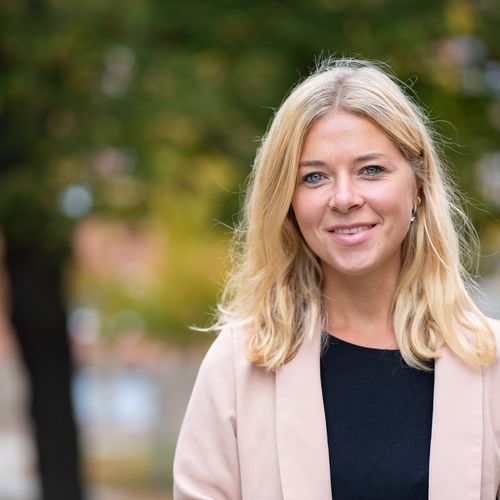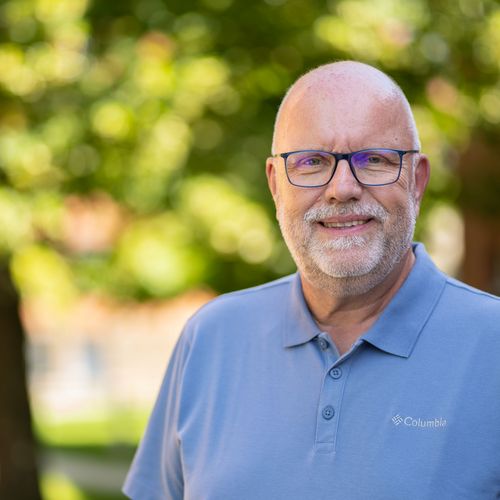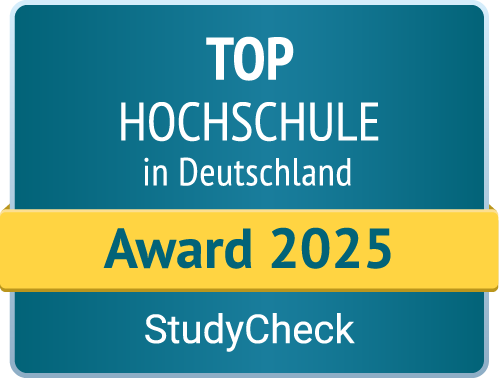
A degree programme for anyone who wants to think beyond borders
Do you want to learn how people from different cultures can work together successfully? Are you interested in business – but also in language, society and global developments? And are you looking for a degree programme that fits your life, not the other way around?
Then the Bachelor's degree programme in Intercultural Management at the Rothenburg campus is just right for you.
Here, you will be specifically prepared for management tasks in internationally active companies. You will develop a sound understanding of business administration and, at the same time, learn to recognise cultural differences as potential – not as obstacles. Digital skills, business English and another foreign language will prepare you for the challenges of a globally networked working world.
Diversity that connects
People with different life paths, professional experiences and cultural backgrounds come together here. This diversity shapes everyday student life – and ensures that you learn not only from books, but also from each other.
Flexibility that fits your life
The programme is organised in a blended learning format: online learning is combined with face-to-face phases – ideal for anyone who wants to combine work, family or other commitments with their studies. Whether full-time or part-time, you can structure your studies to fit your everyday life.
Prospects that lead further
With a degree in Intercultural Management, a wide range of career paths are open to you – in international project management, human resources, tourism or consulting. What you learn here is in demand wherever people and markets meet.
| Short form | IKV / IKM |
| Type of study | Full time / Part time |
| Duration | 7 semesters / 14 semesters |
| Award | Bachelor of Arts (B.A.) |
| Start of studies | Winter semester |
| Admission restrictions | none |
| Lecture location | Rothenburg, Blended Learning |
| Language of instruction | German |
| Course management | Prof. Dr. Ritam Garg |
| Student advisory service | Daniela Frank-Müller |
| Student Services | studierendenservice.ikm(at)hs-ansbach.de |
Contents
The full-time bachelor's programme consists of seven semesters. The duration of the part-time bachelor programme depends on each individual’s respective time schedule.
In the beginning of the programme, the focus of the studies will be languages (English or German as a foreign language as well as an additional foreign language), the foundations of business & management, intercultural management, as well as digital skills. Furthermore, Students will be able to deepen, and broaden the knowledge acquired by choosing an area of specialization, and gaining experience in an applied project management. Moreover, the practical semester provides an opportunity to apply the acquired knowledge in practice. General elective courses - suitable for the major field of study - round off the overall studies.
Upon successful completion of the Bachelor thesis, students will be awarded a Bachelor of Arts degree (B.A.), an internationally recognized, and accredited academic qualification.
Teaching methodology and attendance
Study flexibly! The blended learning mode gives you greater flexibility than a standard degree programme. At the Rothenburg campus, you will take part in face-to-face events and tutorials on average one to two days a week during the semester, use the counselling services or simply come along to study undisturbed - alone or with your fellow students. For the most part, you can organise your time flexibly between classroom sessions. All courses are managed via Ansbach University's digital learning platform and you can access your learning content at any time - including via an app.
The advantages of face-to-face courses (social exchange, practical practice) are combined with the advantages of online study (individual time management, variety of media) in a didactically sensible way.
The Intercultural Management degree programme offers state-of-the-art methods of digital university teaching for people with a high need for individual time management.

Prospects
The skills acquired in the Intercultural Management programme, will equip the students to tackle the challenges of day-to-day intercultural situations not only within the organizations, but also in their daily lives. Furthermore, their chosen specializations will enable them to focus on specific jobs, and industries. In the same vein, the comprehensive analysis of case studies based on real-life examples will prepare the students to handle critical issues in the professional scenario. Therefore, after successful completion of the programme, the students will be equipped to join an organization/firm, and take on the challenges of managerial responsibilities in an increasingly volatile, and a dynamic economic setting.
Rothenburg Campus
Studying at the new Rothenburg campus means: balance between the old and the new. Built around 1900s, the school (location of the campus) possesses numerous Art Nouveau features, and is located directly next to Rothenburg's historic city wall. The heritage-listed building has been given a modern interior to accommodate the needs of the Intercultural Management Programme. The state of the art seminar rooms, equipped with latest technology and tools impart not only high quality in class teaching, but also offer remote learning possibilities. Additionally, there are dedicated rooms only for students, for learning, brainstorming, discussions, assignments and creative exercises, for example, think boxes, a library, multimedia rooms, an academic refectory, and an auditorium with a keynote stage, thus providing the campus with a distinctive flair in the heart of Rothenburg ob der Tauber.
Moreover, Rothenburg, a picturesque old town, also offers young people an enormous range of recreational activities. Due to its international popularity, Rothenburg has an intercultural character, has a lively pub scene with many delicious beer and wine specialties from the region, and is the venue for a variety of interesting cultural events such as the Taubertal Open-Air Festival, the Reichsstadttage or the Christmas Market. Rothenburg is located in the Frankenhöhe Nature Park in a magical landscape with small streams, Franconian villages, old mills and picturesque valleys waiting to be discovered on foot, by bike or in a canoe.
Furthermore, Rothenburg not only boasts of a bustling tourism sector, but is also home for numerous medium-sized companies in the fields of trade, services, industry and crafts - including market leaders in the fields of mechanical engineering, electrical engineering, smart homes, and project consulting.

Application and submission
You can join the Intercultural Management programme only in the winter semester. As with all degree programmes, you must apply in good time via the online application portal. Please note that the deadlines given are the cut-off deadlines. We must therefore receive your application by the end of the last day of the respective deadline at the very latest. Here you will find all information about how to apply. Here you will find all the information you need to apply.
The recommended prerequisites for the language modules (B2 for Business English and A1 for the other foreign language) can be made up flexibly during the first semesters if necessary. The Language Centre (link to the Language Centre: www.hs-ansbach.de/weiterbildung/sprachenzentrum/ ) at Ansbach University of Applied Sciences offers advice and a wide range of language courses.

Staff

Prof. Dr. Ritam Garg
Studiengangsleiter Interkulturelles Management (IKM)
0173 5968546 ROT 1.05b (Hornburgweg 26, 91541 Rothenburg o.d.T.) nach Vereinbarung ritam.garg vCard
Prof. Dr. Ritam Garg

Studiengangsleiter Interkulturelles Management (IKM)
Funktionen:
- Studiengangsleiter Interkulturelles Management (IKM)
Lehrgebiete:
- Interkulturelles Management
- Management in Ostasien
- Management in Emerging Markets
- Internationales Personalmanagement
Vita:
Ritam Garg hat seinen MBA sowie M.Sc. in Telekommunikationselektronik in Großbritannien gemacht. Er hat in Internationales Management in Indien promoviert und war Postdoctoral Researcher an der FAU Erlangen-Nürnberg am Lehrstuhl Internationales Management. Seine Forschungsinteressen umfassen Interkulturelles Management, Indigenes Management, Emerging Markets und International Business Strategy.
Publikationen:
HIER klicken für die vollständige Liste.

Daniela Frank-Müller
Studienberatung und -organisation Studiengänge Interkulturelles Management (IKM)
0162 2522249 ROT 0.06 (Hornburgweg 26, 91541 Rothenburg o.d.T.) nach Vereinbarung daniela.frankmueller vCard
Daniela Frank-Müller

0162 2522249
ROT 0.06 (Hornburgweg 26, 91541 Rothenburg o.d.T.)
nach Vereinbarung
daniela.frankmueller
vCard
Studienberatung und -organisation Studiengänge Interkulturelles Management (IKM)
Funktionen:
- Koordinatorin Campus Rothenburg / Studiengangorganisation und -beratung
- Studienberatung und -organisation Studiengänge Digital Marketing (DIM)
- Studienberatung und -organisation Studiengänge Interkulturelles Management (IKM)

Sandra Sauter
Campusassistenz Studienzentrum Rothenburg (ROT)
+49 172 664 3014 ROT 0.06 Hornburgweg 26, 91541 Rothenburg o.d.T. nach Vereinbarung sandra.sauter vCard
Sandra Sauter

+49 172 664 3014
ROT 0.06 Hornburgweg 26, 91541 Rothenburg o.d.T.
nach Vereinbarung
sandra.sauter
vCard
Campusassistenz Studienzentrum Rothenburg (ROT)
Funktionen:
- Campusassistenz Studienzentrum Rothenburg (ROT)

Veronika Stier
Wissenschaftliche Mitarbeiterin / Ansprechpartnerin für Bachelorarbeiten
0162 235 1019 Campus Rothenburg, Hornburgweg 26, 91541 Rothenburg o.d.T. nach Vereinbarung veronika.stier vCard
Veronika Stier

0162 235 1019
Campus Rothenburg, Hornburgweg 26, 91541 Rothenburg o.d.T.
nach Vereinbarung
veronika.stier
vCard
Wissenschaftliche Mitarbeiterin / Ansprechpartnerin für Bachelorarbeiten
Funktion
- Wissenschaftliche Mitarbeiterin
- Ansprechpartnerin für Bachelorarbeiten

Prof. Dr. Carolin Durst
Professorin Interkulturelles Management (IKM) / Standortleitung
+49 (0) 9861 8724680 ROT 1.05c (Hornburgweg 26, 91541 Rothenburg o.d.T.) nach Vereinbarung carolin.durst vCard
Prof. Dr. Carolin Durst

+49 (0) 9861 8724680
ROT 1.05c (Hornburgweg 26, 91541 Rothenburg o.d.T.)
nach Vereinbarung
carolin.durst
vCard
Professorin Interkulturelles Management (IKM) / Standortleitung
Funktionen:
- Professorin für Digital Marketing
- Studiengangleiterin Digital Marketing (DIM)
- Professorin Künstliche Intelligenz und Kognitive Systeme (KIK)
- Wissenschaftliche Leitung Campus Rothenburg
- Wissenschaftliche Leitung der Gründungsberatung
- Forschungsprofessur für Digitale Go-to-Market-Strategien
- Leitung Zertifikat Digital B2B Marketing
Forschungsschwerpunkte:
- Fuzzy Front End of Content Marketing
- Entrepreneurial Ecosystems
- Product-Market Fit Design
Lehrgebiete:
- Digital Marketing
- Marketingstrategie
- Content Marketing
- B2B Marketing
Vita
Prof. Dr. Carolin Durst lehrt und forscht im Bereich B2B Digital Marketing zu den Themen strategisches Content Marketing und Go-to-Market-Strategien. An der Hochschule Ansbach leitet sie den Masterstudiengang Digital Marketing, wissenschaftliche Leitung am Campus Rothenburg, Autorin des B2B Digital Marketing Playbook und hat die Forschungsprofessur „Digitale Go-to-Market-Strategien inne.
Carolin Durst studierte Betriebswirtschaft an der Friedrich-Alexander-Universität Erlangen-Nürnberg (FAU). Nach ihrer Promotion am Institut für Wirtschaftsinformatik der FAU absolvierte sie zwei Forschungsaufenthalte an der Cape Peninsula University of Cape Town und dem Royal Melbourne Institute of Technology. Als PostDoc und akademische Rätin an der FAU beschäftigte sie sich in der Forschung mit der Analyse und der Gestaltung von sozio-technischen Systemen. Von 2015 bis 2016 war sie Professorin für Wirtschaftsinformatik an der Universität Bremen. Als Professorin für Digital Marketing lehrt und forscht Carolin Durst seit August 2018 an der Hochschule Ansbach.
Forschungs- und Transferprojekte
- Existency: EXISTENCY ist das gemeinsame Start-Up Programm der Friedrich-Alexander-Universität Erlangen Nürnberg, der Technischen Hochschule Nürnberg und der Hochschule Ansbach.
- IMPACT E³: Impact Entrepreneurship Qualifizierungsprogramm für Studierende aller Fachbereiche an allen drei Verbundhochschulen der Friedrich-Alexander-Universität Erlangen Nürnberg, der Hochschule Ansbach und der Hochschule Weihenstephan-Triesdorf. Ziel des Verbundprojekts ist es, Studierende zu befähigen, innovative Lösungsansätze für gesellschaftliche und ökologische Herausforderungen durch unternehmerisches Denken und Handeln zu entwickeln und umzusetzen.
- Connected Guest Experience (abgeschlossen): Mit dem Forschungsprojekt Connected Guest Experience verfolgt Projektleiterin Prof. Carolin Durst einen Bottom-Up-Ansatz: Die Basis dafür stellt das Burg Hotel Colmberg unweit von Rothenburg ob der Tauber da. Hier sollen maßgeschneiderte Angebote für unterschiedliche Zielgruppen, die mit geeigneten Kooperationspartnern aus der Region entwickelt werden, direkt und rund um die Uhr über innovative Medienstationen abrufbar an die Gäste vermittelt werden. Ziel dabei ist es, das häufig noch starre Korsett des Urlaubserlebens in der Region aufzubrechen und durch einzigartige und tiefergreifende Experiences zu ersetzen. Damit soll schließlich nicht nur die durchschnittliche Aufenthaltsdauer der Tourist*innen gesteigert werden, sondern im Sinne einer win-win-Situation auch die Region und deren vielfältige Dienstleiser gefördert werden.
- EXIST Gründerstipendium brightensport (abgeschlossen): Brightensport ist eine digitale Plattform für die KI-gestützte Videoanalyse durch Profisportler:innen für Breitensportler:innen
Betreute Promotionen
- Leveraging successful entrepreneurs in entrepreneurial ecosystems: What attracts them and makes them contribute (Promovend Johannes Hähnlein)
Publikationen

Prof. Dr. Alexander Piazza
Professor Interkulturelles Management (IKM)
0173 2611472 ROT 1.05 (Hornburgweg 26, 91541 Rothenburg o.d.T.) nach Vereinbarung alexander.piazza vCard
Prof. Dr. Alexander Piazza

0173 2611472
ROT 1.05 (Hornburgweg 26, 91541 Rothenburg o.d.T.)
nach Vereinbarung
alexander.piazza
vCard
Professor Interkulturelles Management (IKM)
Funktionen:
- Professor Digital Marketing (DIM)
- Studienfachberatung Digital Marketing (DIM)
- Professor Interkulturelles Management (IKM)
- Professor Angewandte Künstliche Intelligenz und Digitale Transformation (KDT)
Lehrgebiete:
- Social Media Marketing & Analytics
- Data Science & Customer Insights
- Analyse unstrukturierter Daten (Text Analytics, Image Analytics)
- Produktempfehlungssysteme und personalisierte Kundenansprache
- Search Marketing
Vita:
- Seit 2021: Professor für Digitale Kommunikation und Angewandte Künstliche Intelligenz an der Hochschule Ansbach
- Seit 2018: Senior Data Scientist bei der adidas AG
- 2018: Promotion zum Thema: „Fashion product recommendation - The predictive power of consumer and product attributes derived from Big Data” (Dr. rer. pol.)
- 2011 bis 2017: Externer Doktorand bei der adidas AG in den Bereichen IT-Innovation und Digital Analytics
- 2011 bis 2017: Wissenschaftlicher Mitarbeiter am Lehrstuhl für Wirtschaftsinformatik, insbes. im Dienstleistungsbereich an der Friedrich-Alexander-Universität Erlangen-Nürnberg
- 2008 bis 2011: Masterstudium Internationale Wirtschaftsinformatik (M.Sc.)
- 2005 bis 2008: Bachelorstudium Computational Engineering (B.Sc.)
- 1999 bis 2002: Berufsausbildung zum Fachinformatiker für Anwendungsentwicklung (IHK)
Publikationen:

Prof. Dr. Markus Skripek
Professor Interkulturelles Management (IKM) / Vorsitzender Prüfungskommission Interkulturelles Management (IKM)
0981 4877-217 50.3.7 nach Vereinbarung markus.skripek vCard
Prof. Dr. Markus Skripek

Professor Interkulturelles Management (IKM) / Vorsitzender Prüfungskommission Interkulturelles Management (IKM)
Funktionen:
- Studiengangsleitung Betriebswirtschaft (BW)
- Professor Betriebswirtschaft (BW)
- Vorsitzender Prüfungskommission Betriebswirtschaft (BW)
- Professor Interkulturelles Management (IKM)
- Vorsitzender Prüfungskommission Interkulturelles Management (IKM)
- Mitglied Fakultätsrat Wirtschaft
Lehrgebiete:
- Grundlagen der Betriebswirtschaft
- Schwerpunkt Internationale Betriebswirtschaft
- Schwerpunkt Interkulturelles Management
- Unternehmenssimulationen / Planspiele
Vita:
- Studium: BWL Studium an der Universität Mannheim und der EDHEC, Nizza- Frankreich.
- Promotion: Institut für Unternehmensrechnung und Revision der Wirtschaft Universität Wien Prof. Dr. Dr h.c. mult. Anton Egger im Bereich wertorientierte Unternehmensführung.
- Unternehmenspraxis: Prof. Skripek blickt auf eine langjährige Top-Management Karriere im Handel zurück. Zuletzt war er Mitglied des Ländervorstandes eines börsennotierten international tätigen Pharmahandelskonzerns mit Sitz in Brüssel und zuständig für die Bereiche Marketing/Vertrieb und Einkauf. Er managte eine Retail- und Franchise-Kette mit mehreren hundert Outlets. Davor führte er ein in einen Großkonzern eingebettetes, mittelständisch geprägtes Distanzhandelsunternehmen. Dieses hat er während seines Wirkens in eine Vielzahl europäischer Länder internationalisiert. Seine Karriere begann er als Vorstandsassistent bei der Celesio AG (heute: McKesson Europe AG).
- Seit 2014 Professor an der Hochschule Ansbach für Betriebswirtschaftslehre, insbesondere International Management.

Dr. Christian Alexander Gebhard
Auslandsbeauftragter (Outgoings) Studiengänge AWM, IKM
0981 4877-108 50.4.7 nur nach Anmeldung, mittwochs von 13:15 bis 14:15 Uhr in meinem Büro 50.4.7 c.gebhard vCard
Dr. Christian Alexander Gebhard

0981 4877-108
50.4.7
nur nach Anmeldung, mittwochs von 13:15 bis 14:15 Uhr in meinem Büro 50.4.7
c.gebhard
vCard
Auslandsbeauftragter (Outgoings) Studiengänge AWM, IKM
Fuktionen:
- Leiter China-Kompetenzzentrum
- Lehrkraft für besondere Aufgaben (AWM, BWL, Sprachen)
- Auslandsbeauftragter (Outgoings) Studiengänge AWM, IKM
Lehrgebiete:
- Interkulturelles Management China
- Allgemeines Spanisch
- Wirtschaftsspanisch
- Wirtschaftsenglisch
- Allgemeines Chinesisch
- Wirtschaftschinesisch
Publikationen:
In preparation. A Look into the Profiles of Adult Learners of Chinese as a Foreign Language in German-Speaking Countries. To appear in: Fremdsprachen und Hochschulen.
2024. Co-author Baudracco-Kastner, M. Virtuelle Lernräume als Orte der Begegnung: Zweckmäßige Onlineformate nach der Pandemie sinnvoll einsetzen. In S. Gollisch & P. Gröner (Eds.), Ansbacher Kaleidoskop 2024 Festschrift zum 60. Geburtstag von Prof. Dr. Ute Ambrosius und Prof. Dr. Barbara Hedderich (pp. 72–97). Shaker.
2024. Fremdsprachenunterricht im digitalen Lernraum: Internationalisierung zu Hause. In J. Noller, C. Beitz-Radzio, M. Förg, S. E. Johst, D. Kugelmann, S. Sontheimer, & S. Westerholz (Eds.), Medien-Räume (pp. 61–82). Springer Fachmedien Wiesbaden.
2023. The race for China expertise. In D. Catalá Pérez (Ed.), Business Meets Technology, 5th international conference: Universitat Politècnica de València, Spain, July 13th-15th,
2023 (pp. 205–216). International Conference Business Meets Technology, Valencia. edUPV, Universitat Politècnica de València.
2022. Co-author: Baudracco-Kastner, M. We’re more equal on Zoom: Inclusion and personal relations in the virtual classroom. Why we shouldn’t abandon what we’ve learned in the pandemic. In B. Hedderich, M. Walter, S. Stadler, E. Didion, M. R. Perello Marín, & D. Catalá Pérez (Eds.), Proceedings—4th International Conference Business Meets Technology 2022 (pp. 286–302). Editorial Universitat Politècnica de València.
2022. Wie gehen Chinesischlernende mit Hànyǔ Pīnyīn um? Eine Fehleranalyse im Anfängerunterricht. In D. Wippermann (Ed.), Hanyu Pinyin in der Didaktik der chinesischen Sprache und Zeichenschrift (pp. 175–198). Iudicium Verlag.
2022. Who attends our foreign language courses? A preliminary look into the profile of learners of Chinese. In B. Hedderich, M. Walter, S. Stadler, E. Didion, M. R. Perello Marín, & D. Catalá Pérez (Eds.), Proceedings—4th International Conference Business Meets Technology 2022 (pp. 256–265). Editorial Universitat Politècnica de València.
2021. The Necessity to Make Errors: The case of German learners of Spanish. In M. R. Perello Marín, C. Carrascosa López, & D. Catalá Pérez (Eds.), Proceedings 3rd International Conference. Business Meets Technology (pp. 61–68). Editorial Universitat Politècnica de València.
2021. Exkursion nach China: Chinesische Lesetexte für Fortgeschrittene. Hefei Huang Verlag.
2021. China Competence in Europe: Why It Matters and How to Achieve It. In M. R. Perello-Marín, C. Carrascosa López, & D. Catalá Pérez (Eds.), Proceedings 3rd International Conference. Business Meets Technology (pp. 69–78). Editorial Universitat Politècnica de València.
2020. Some Suggestions for Teaching Foreign Languages Online. In B. Hedderich, M. A. Hedderich, & M. S. J. Walter (Eds.), Business meets technology 2: Proceedings of the 2nd International Conference of the University of Applied Sciences Ansbach 3rd—4th of July 2020 (pp. 18–21). Hochschule Ansbach, Düren. Shaker Verlag.
2020. Portfolios as Performance Records in a Reflective Approach in Teaching Chinese as a Foreign Language. In B. Hedderich, M. A. Hedderich, & M. S. J. Walter (Eds.), Business meets technology 2: Proceedings of the 2nd International Conference of the University of Applied Sciences Ansbach 3rd—4th of July 2020 (pp. 22–25). Hochschule Ansbach, Düren. Shaker Verlag.
2020. Das Lernportfolio als Leistungsnachweis im Chinesischunterricht. CHUN - Chinesisch-Unterricht, 35, 86–102.
2020. An Error Analysis of Beginners’ Oral Exams of German Learners of Chinese. In U. Ambrosius & P. Gröner (Eds.), Ansbacher Kaleidoskop 2020 (pp. 64–81). Shaker Verlag.
2019. Trainingsbuch der deutschen Sprache. Lehrwerk – Texte und Aufgaben. LOGO-Praktikanten in Deutschland und wo sie zu finden sind.
2019. Häufige Fehler in der schriftlichen Produktion erwachsener Lernender des Spanischen im Anfängerstadium. In D. Reimann, F. Robles i Sabater, & R. Sánchez Prieto (Eds.), Kontrastive Pragmatik in Forschung und Vermittlung: Deutsch, Spanisch und Portugiesisch im Vergleich (pp. 265–286). Contrastivica, Tübingen. Gunter Narr Verlag.
2018. Co-author Mahúgo Cardenes, M. del C. Learning Strategies of German University Students of Spanish as a Foreign Language: Profile of the Independent Learner in a European Context. In B. Hedderich, M. S. J. Walter, & P. Gröner (Eds.), Business meets technology: Proceedings of the 1st International Conference of the University of Applied Sciences Ansbach: 25th to 27th January 2018 (pp. 90–93). Hochschule Ansbach, Aachen. Shaker Verlag.
2018. Co-author Zhang, M. Wirtschaftskorrespondenz Chinesisch: Zielsicher formulieren - erfolgreich handeln. chinabooks.ch.
2018. Praxisbericht: Interkulturelles Video-Tandem an der Hochschule Ansbach. Zeitschrift Für Interkulturellen Fremdsprachenunterricht, 23(1), 149–154.
2018. Gesten im Chinesischunterricht. Interkulturelle Kompetenz: Die Forderungen der Bildungsstandards und ihre Verwirklichung im Unterricht, 7, 65–73.
2018. Foreign Language Learners’ Frequent Errors: An Investigation of Chinese and Spanish. In B. Hedderich, M. S. J. Walter, & P. Gröner (Eds.), Business meets technology: Proceedings of the 1st International Conference of the University of Applied Sciences Ansbach: 25th to 27th January
2018 (pp. 76–79). Hochschule Ansbach, Aachen. Shaker Verlag.
2016. Spanisch an der Hochschule Ansbach: Häufige Fehler in der schriftlichen Produktion. In U. Ambrosius & S. Gollisch (Eds.), Ansbacher Kaleidoskop 2016 (pp. 169–188). Shaker.
2015. Rezension: Weber, Hui: Lóng neu A1-A2. Chinesisch für Anfänger (Komplettpaket). CHUN - Chinesisch-Unterricht, 30, 102–106.
2014. El uso de medios comunicativos no verbales en programas de noticias alemanes, españoles y portugueses. In D. Reimann (Ed.), Kontrastive Linguistik und Fremdsprachendidaktik Iberoromanisch – Deutsch: Studien zu Morphosyntax, Mediensprache, Lexikographie und Mehrsprachigkeitsdidaktik (Spanisch, Portugiesisch, Katalanisch, Deutsch) (pp. 183–198). Narr Francke Attempto.
2014. Eine Übersicht über spielerische kooperative Lernformen im Chinesischunterricht. CHUN - Chinesisch-Unterricht, 29, 86–100.
2012. Sprechtempo im Sprachvergleich: Eine Untersuchung phonologischer und kultureller Aspekte anhand von Nachrichtensendungen. Humboldt-Universität zu Berlin.
2012. La velocidad articulatoria sujeta a la estructura silábica. In N. M. Iglesias Iglesias (Ed.), Contrastivica II: Aktuelle Studien zur Kontrastiven Linguistik Deutsch-Spanisch-Portugiesisch II (pp. 23–43). ibidem-Verlag.
2011. A velocidade de articulação sujeita a estruturas silábicas predominantes: Português brasileiro e português europeu em contraste. In M. Arden, C. Märzhäuser, B. Meisnitzer, & W. Abraham (Eds.), Linguística do português: Rumos e pontes (pp. 137–150). Deutscher Lusitanistentag, München. Meidenbauer.

Sabine McIntosh
Lehrkraft für besondere Aufgaben Betriebswirtschaft (BW)
0981 4877-218 50.4.7 Mittwoch 14.00-15.00 Uhr (nach Vereinbarung) sabine.mcintosh vCard
Sabine McIntosh

Lehrkraft für besondere Aufgaben Betriebswirtschaft (BW)
Funktionen:
- Lehrkraft für besondere Aufgaben Betriebswirtschaft (BW)
- Lehrkraft für besondere Aufgaben (Englisch, Ansprechpartnerin für Italienisch, Französisch) Interkulturelles Management (IKM)
- Lehrkraft für besondere Aufgaben Sprachenzentrum
- Mitglied Fakultätsrat Wirtschaft
- Frauenbeauftragte Fakultät Wirtschaft
Lehrgebiete:
- Wirtschaftsenglisch

Ralph-Peter Kappestein
Leiter Studierendenservice der School of Business and Technology (SBT)
0981 4877-143 BHS 3.02 (Brauhausstraße 15, 91522 Ansbach) nach Vereinbarung ralph-peter.kappestein vCard
Ralph-Peter Kappestein

0981 4877-143
BHS 3.02 (Brauhausstraße 15, 91522 Ansbach)
nach Vereinbarung
ralph-peter.kappestein
vCard
Leiter Studierendenservice der School of Business and Technology (SBT)
Funktionen:
- Leiter Studierendenservice der School of Business and Technology (SBT)
© 2025 Hochschule Ansbach



